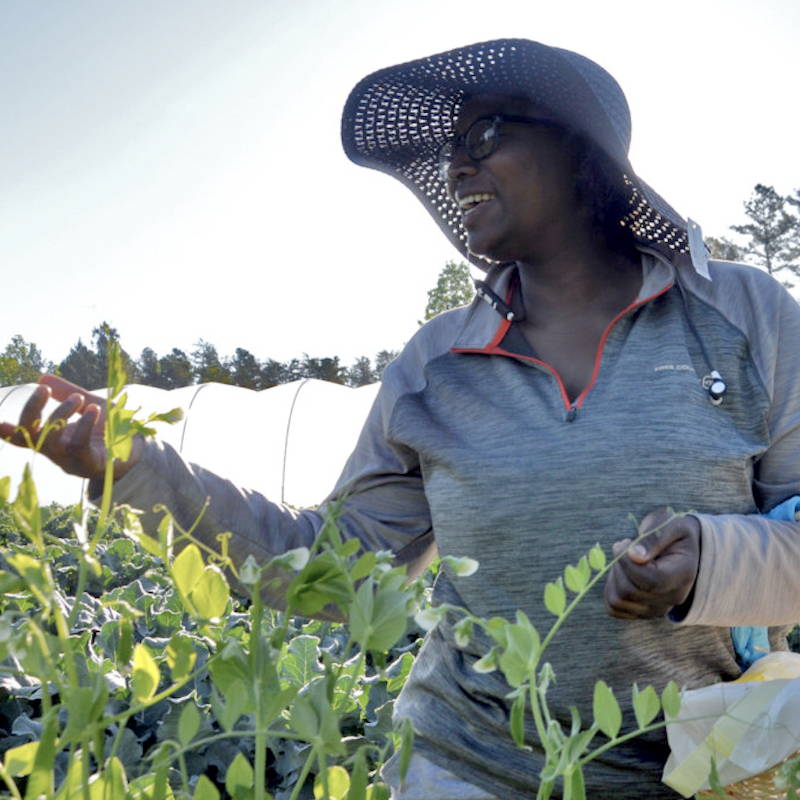Link About It: This Week’s Picks
Reclaiming the world’s oldest rainforest, gender identity as a human right, redressing design history and more from around the web

Benevolence Farm Opens Pathways For Formerly Incarcerated Women
 On 13 acres in North Carolina, Benevolence Farm—founded by Tanya Jisa—exists as an employment and residency program that helps recently incarcerated women adjust to life after prison. Through fair wages, housing and a connection to nature, this initiative provides residents with support that the criminal justice system fails to supply. While it’s creating pathways toward a sustainable, employed future for residents—and has already lowered the rate of recidivism for their employees down to 5% (a rate lower than the national average of 40%)—the farm’s goals are much bigger. Staff at Benevolence also advocate for larger systemic upheaval, helping women who are currently in prison and organizing for a fairer society where prisons don’t exist at all. Learn more about the farm and its inspiring work at Civil Eats.
On 13 acres in North Carolina, Benevolence Farm—founded by Tanya Jisa—exists as an employment and residency program that helps recently incarcerated women adjust to life after prison. Through fair wages, housing and a connection to nature, this initiative provides residents with support that the criminal justice system fails to supply. While it’s creating pathways toward a sustainable, employed future for residents—and has already lowered the rate of recidivism for their employees down to 5% (a rate lower than the national average of 40%)—the farm’s goals are much bigger. Staff at Benevolence also advocate for larger systemic upheaval, helping women who are currently in prison and organizing for a fairer society where prisons don’t exist at all. Learn more about the farm and its inspiring work at Civil Eats.
Image courtesy of Keia Blount/Civil Eats
Indigenous Traditional Owners Take Back World’s Oldest Rainforest
 In north Queensland, Australia, the heritage-listed Daintree—the world’s oldest rainforest—has been reclaimed by the Eastern Kuku Yalanji people, the Indigenous traditional owners. In a historic deal with the state government, the Daintree along with Ngalba Bulal, Kalkajaka and Hope Islands national parks will be handed back and the traditional custodians will manage them with assistance from the government for some time, but the goal is for it to be solely run by the Eastern Kuku Yalanji people. In 1988 the park became UNESCO-listed, but regarding environmental—rather than cultural—significance. As Chrissy Grant (traditional owner and the incoming chair of the Wet Tropics Management Authority board) says, “There was no consultation with Aboriginal people and no recognition of the values of the… oldest rainforest in the world, being continuously occupied by Aboriginal people. Wherever you go there are communities within the tropical rainforest.” The Daintree joins a hopefully growing list of sites taken back by Indigenous groups, along with Uluru and Kakadu. Read more at The Guardian.
In north Queensland, Australia, the heritage-listed Daintree—the world’s oldest rainforest—has been reclaimed by the Eastern Kuku Yalanji people, the Indigenous traditional owners. In a historic deal with the state government, the Daintree along with Ngalba Bulal, Kalkajaka and Hope Islands national parks will be handed back and the traditional custodians will manage them with assistance from the government for some time, but the goal is for it to be solely run by the Eastern Kuku Yalanji people. In 1988 the park became UNESCO-listed, but regarding environmental—rather than cultural—significance. As Chrissy Grant (traditional owner and the incoming chair of the Wet Tropics Management Authority board) says, “There was no consultation with Aboriginal people and no recognition of the values of the… oldest rainforest in the world, being continuously occupied by Aboriginal people. Wherever you go there are communities within the tropical rainforest.” The Daintree joins a hopefully growing list of sites taken back by Indigenous groups, along with Uluru and Kakadu. Read more at The Guardian.
Image courtesy of Kerry Trapnell/Queensland Conservation Council
Research on Chili Peppers + Menthol Could Lead to Non-Opioid Pain Relief
 Scientists David Julius and Ardem Patapoutian were recently awarded the 2021 Nobel Prize in Medicine for their essential research, studying how humans sense their environment. Julius used capsaicin (the spice found in chili peppers) to discover how nerve cells respond to increasing levels of spice, while Patapoutian’s work uncovered a fundamental gene that illuminates how bodies translate stimuli. Both scientists, through independent research, relied on menthol to locate a receptor that senses the cold, deepening scientists’ understanding of bodily reactions. Thanks to these groundbreaking discoveries, researchers can now work toward medical treatments that don’t rely on opioids for pain relief. Find out more about these studies at Smithsonian Magazine.
Scientists David Julius and Ardem Patapoutian were recently awarded the 2021 Nobel Prize in Medicine for their essential research, studying how humans sense their environment. Julius used capsaicin (the spice found in chili peppers) to discover how nerve cells respond to increasing levels of spice, while Patapoutian’s work uncovered a fundamental gene that illuminates how bodies translate stimuli. Both scientists, through independent research, relied on menthol to locate a receptor that senses the cold, deepening scientists’ understanding of bodily reactions. Thanks to these groundbreaking discoveries, researchers can now work toward medical treatments that don’t rely on opioids for pain relief. Find out more about these studies at Smithsonian Magazine.
Image by Niklas Elmehed, courtesy of Nobel Prize Outreach/Smithsonian Magazine
New Slate of Books + Exhibitions Redress Women’s Contributions to Design History
 This fall, two books and two international exhibits will highlight women designers whose groundbreaking work shaped the industry, redressing the design world’s exclusionary history. The upcoming works will span genres of design. The book Baseline Shift: Untold Stories of Women in Graphic Design History, for instance, covers calligraphers and bookmakers among other designers, while the book Designing Motherhood: Things that Make and Break Our Births showcases the women behind objects related to reproduction. The two exhibitions—at the Tate Modern and Vitra Design Museum—also shine a light on a diversity of pioneers, from Sophie Taeuber-Arp to furniture and fashion innovators. These new initiatives, while just a step in the long road toward gender equity in the design industry, celebrate and credit women for their legendary work. Find out more at Fast Company.
This fall, two books and two international exhibits will highlight women designers whose groundbreaking work shaped the industry, redressing the design world’s exclusionary history. The upcoming works will span genres of design. The book Baseline Shift: Untold Stories of Women in Graphic Design History, for instance, covers calligraphers and bookmakers among other designers, while the book Designing Motherhood: Things that Make and Break Our Births showcases the women behind objects related to reproduction. The two exhibitions—at the Tate Modern and Vitra Design Museum—also shine a light on a diversity of pioneers, from Sophie Taeuber-Arp to furniture and fashion innovators. These new initiatives, while just a step in the long road toward gender equity in the design industry, celebrate and credit women for their legendary work. Find out more at Fast Company.
Image of Cristoph Sagel/VG Bild-Kunst, Bonn (2021), courtesy of Vitra Design Museum
The First Complete Solution For Microgreen Gardening in Gastronomy + Hospitality
 Studio Oberhauser recently released the EmotionCube Microgreen, and it’s setting a bounty of precedents. The cube is the first complete solution for microgreen gardening in the gastronomy and hospitality industry, as well as the first walk-in climate greenhouse that uses liquid crystal glazing, automatic doors and a climate-regulating tuff stone floor. Made using 100% recyclable materials, the impressive cube is equipped with infrared lighting that sustains plants in their best growing conditions. Its eco-forward, innovative technology makes the EmotionCube an easy and obvious nomination for the German Design Award 2022. Read more about the greenhouse’s novel construction at designboom.
Studio Oberhauser recently released the EmotionCube Microgreen, and it’s setting a bounty of precedents. The cube is the first complete solution for microgreen gardening in the gastronomy and hospitality industry, as well as the first walk-in climate greenhouse that uses liquid crystal glazing, automatic doors and a climate-regulating tuff stone floor. Made using 100% recyclable materials, the impressive cube is equipped with infrared lighting that sustains plants in their best growing conditions. Its eco-forward, innovative technology makes the EmotionCube an easy and obvious nomination for the German Design Award 2022. Read more about the greenhouse’s novel construction at designboom.
Image courtesy of Studio Oberhauser
Canadian Court Rules Misgendering is a Human Rights Violation
 Four years ago, Canada passed the legally unprecedented C-16 bill, meant to protect people who are transgender and gender-nonconforming from discrimination based on identity. Last week, the bill was tested for the first time. During an employment dispute, the British Columbia Human Rights Tribunal ruled in favor of Jessie Nelson, a gender-fluid restaurant worker who filed a complaint against their manager for purposefully misgendering them. The court ruled that deliberate misgendering in the workplace is a human rights violation, ordering the restaurant to pay Nelson damages. Pronouns are “a fundamental part of a person’s identity,” writes Tribunal representative Devyn Cousineau in the ruling. “Using the correct pronouns validates and affirms they are a person equally deserving of respect.” Learn more about this significant step in the right direction at Them.
Four years ago, Canada passed the legally unprecedented C-16 bill, meant to protect people who are transgender and gender-nonconforming from discrimination based on identity. Last week, the bill was tested for the first time. During an employment dispute, the British Columbia Human Rights Tribunal ruled in favor of Jessie Nelson, a gender-fluid restaurant worker who filed a complaint against their manager for purposefully misgendering them. The court ruled that deliberate misgendering in the workplace is a human rights violation, ordering the restaurant to pay Nelson damages. Pronouns are “a fundamental part of a person’s identity,” writes Tribunal representative Devyn Cousineau in the ruling. “Using the correct pronouns validates and affirms they are a person equally deserving of respect.” Learn more about this significant step in the right direction at Them.
Image courtesy of Getty Images
India’s First Art + Design Newspaper Fosters The Creative Community
 Seasonal recipes, essays on rewilding in India and dystopian visuals make up some of the inspiring work from the first edition of The Irregular Times (TIRT), a publication founded by a small team in New Delhi. TIRT came to fruition when the pandemic cancelled India’s annual independent art fair, inspiring the team to bring art to the people instead. The quarterly zine—which is India’s first art and design newspaper—celebrates the joys of DIY culture and analog printing, while striving to foster an inclusive and accessible creative community. Strong design details run throughout the paper, including interactive elements and unique typography made in collaboration with Mumbai-based studio BunxPav. View more of the publication’s experimental layout and learn about its future ambitions at Hyperallergic.
Seasonal recipes, essays on rewilding in India and dystopian visuals make up some of the inspiring work from the first edition of The Irregular Times (TIRT), a publication founded by a small team in New Delhi. TIRT came to fruition when the pandemic cancelled India’s annual independent art fair, inspiring the team to bring art to the people instead. The quarterly zine—which is India’s first art and design newspaper—celebrates the joys of DIY culture and analog printing, while striving to foster an inclusive and accessible creative community. Strong design details run throughout the paper, including interactive elements and unique typography made in collaboration with Mumbai-based studio BunxPav. View more of the publication’s experimental layout and learn about its future ambitions at Hyperallergic.
Image courtesy of TEAM TIRT/Hyperallergic
Link About It is our filtered look at the web, shared daily in Link and on social media, and rounded up every Saturday morning. Hero image courtesy of Studio Oberhauser












